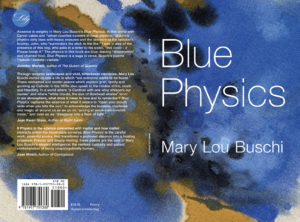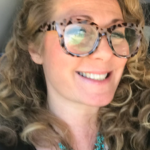Poet Mary Lou Buschi is chatting with me about her new collection, Blue Physics.

Bio:
Mary Lou Buschi (She/Her) is the author of 3 chapbooks and 3 full length poetry collections. Her 3rd book, BLUE PHYSICS was just published in February 2024 (Lily Poetry Review books). Her poems have appeared in literary journals such as Ploughshares, Glacier, Willow Springs, On the Seawall, among many others. Mary Lou is a graduate of the Warren Wilson MFA Program for Writers and holds an MS in Urban Education from Mercy University. Currently, she is a special education teacher working with students on the spectrum.
What do you enjoy most about writing poems?
Writing poems is a form of meditation for me. Time stops, and there are no distractions. I sometimes wake from writing and realize it’s late morning. The writing process is very different from the editing process which I also really enjoy. Tinkering with all the possibilities. The best time to edit your work is when you have enough space away from the poems, so that you can read them as if someone else had written them. Then there is the business of submitting one’s work. Not as much fun but none the less, important for sharing your work.
Can you give us a little insight into a few of your poems – perhaps a couple of your favorites?
Baby Shower is a good example of what I enjoy most about writing prose poems. Form follows function. How the poem’s structure informs the meaning or the surprise. I think when readers look at a paragraph they expect narrative. Flipping that expectation creates a need to resolve what’s happening and by then the reader is already on the journey with you. Also, Baby Shower is based on the creepiest cake I had ever seen.
Spring I. was originally a prose poem. In fact, it was published as a prose poem, but I decided to change the form into couplets for the tension of the line breaks. The image of that flower opening has stayed with me for years. It’s never happened again. Also, the fact that we watched it open together with our bitter 4th grade teacher made the experience more memorable.
Baby Shower
We went in knowing we were hated through a cellophane prism of light. Bags with bears, a fox, an elephant in a box, a clothesline hung with tiny clothespins. Mothers floating in and out, the uterine fluid buoying us all. When the current turns to riptide, speaking different languages of love, a mother’s mother offers me a slice of baby cake. I ate. I ate and ate—ignoring the soft belly, the light pink icing, whipped cream frothing from its center. I ate. I ate and watched the expectant mother giggle at the toes and chubby curves of the ankle and calf as she brightly nuzzled the sweetness past her lips. I am not a mother. Never will be a mother. Watching her tuck what was left of the crumbs and icing, the right arm, part of the shoulder under a blanket of sugar, careful not to touch the face, suspending her disbelief. The baby-still whole and sleeping there.
Spring I.
Days before, we picked irises
from the rectory garden.
The buds leaned in and out
of the breeze—wanton little fists.
Our 4th grade teacher was not a nun.
She wore smart slacks, sweater sets,
kept her coal hair short, made us stand
at her desk, recite the difference between
there, they’re, and their while steadying
a mid-heel Ferragamo on her big toe.
She never smiled. She ate graham crackers
out of a baggie, carefully tapping each
cracker before nuzzling it against her tongue.
It’s opening! A quiet 4th grade watched a bud
yawn open. We knew, we’d never see something
this private, this small and strange,
as if a tiny elephant balancing itself on a thimble
was whispering into our teacher’s ear, miraculous.
What form are you inspired to write in the most? Why?
I primarily write in free verse. Many of my poems are prose poems. I especially love the Haibun which distills the prose poem into Haiku. I also love moving between couplets to prose poems or vice versa. It’s interesting to see/hear how line breaks change the concision and compression of a poem, while the prose poem is deliciously elastic, and it can take you to so many unexpected places from a banal looking rectangle.
What type of project are you working on next?
I will be working with fine art, not necessarily ekphrasis but as way of entering the mind though color and light. Maybe focusing on visual or concrete forms. I have Edward Hopper in mind.
When did you first consider yourself a writer / poet?
I always saw the world and my experiences in images. I wrote overly dramatic poems in high school (as most high schoolers do) but it wasn’t until I was an undergraduate student that I considered getting an MFA in poetry. The best part of that experience was giving myself the time and permission to focus on writing.
How do you research markets for your work, perhaps as some advice for not-yet-published poets?
I read as many literary journals as possible. I also support publishers and presses by buying many poetry books. I look at the presses website and see if my work fits with the other voices there. I attend readings, I do readings. The best advice I can give is to be a part of the community and see where you feel most at home.

What would you say is your interesting writing quirk?
I love writing in public spaces especially on trains. If fact, many of poems take place on a train. I enjoy that liminal space that asks nothing from me.
As a child, what did you want to be when you grew up?
My initial desire was medicine and then I realized I hated blood. After that, I talked about owning a beauty salon. I went to “beauty school” and dropped out right after I had a panic attack during the first hair cut on a real person. We had been working on mannequins for a year prior to graduating to real people. I was at the top of my class until I had to take a pair of scissors to a stranger’s head. I guess you could I say I am a beauty school dropout.
Anything additional you want to share with the readers?
Blue Physics contains many lost boys. It begins with my brother’s disappearance that is still a mystery. The book was difficult for me to write however, I dedicated the book to my brother who never really felt like a real person to me. When I found his letters, I was able to connect with him as he was once a teacher and a writer himself, not just a family myth. The book also tackles issues of racism, being bullied and bullying others, fear, loss of family, and the hypocrisies of organized religion.
